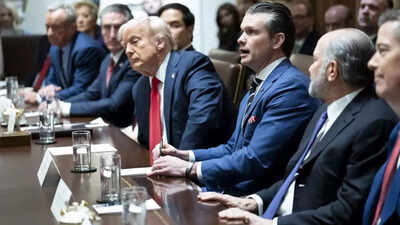- News
- World News
- US News
- Defence secretary Pete Hegseth halts US cyber operations against Russia sparking national security concerns
Trending
Defence secretary Pete Hegseth halts US cyber operations against Russia sparking national security concerns
US Cyber Command has been ordered to cease offensive operations against Russia to bring Putin to the negotiating table on Ukraine. While intelligence experts emphasize the importance of monitoring Russian networks, the decision faces criticism due to security concerns. Critics argue that halting cyber activities assumes reciprocity from Russia, which has a history of cyber warfare.
Defence Secretary Pete Hegseth ordered US Cyber Command to stop all offensive cyber operations against Russia on Sunday, reported The New York Times.
The decision is reportedly part of a broader attempt to bring Russian President Vladimir Putin to the negotiation table regarding Ukraine.
Intelligence experts argue that retaining access to Russian networks is vital for understanding Putin’s strategies and tracking internal Russian discussions about Ukraine. Former officials say it is not unusual to pause military operations during sensitive diplomatic negotiations to prevent disruptions.
Russia has long been accused of cyber warfare, including interference in US elections, ransomware attacks, and sabotage efforts across Europe. In the past year, Russian-linked cybercriminals have been blamed for attacks on US hospitals and infrastructure.
European nations rely on US cyber support to counter these threats, but with this policy shift, they may need to depend more on Britain’s Government Communications Headquarters (GCHQ) and Canadian intelligence.
Meanwhile, the Trump administration has been rolling back efforts to counter Russian influence operations, including FBI-led initiatives to monitor propaganda.
Secretary of State Marco Rubio on Sunday stressed the importance of bringing Russia to the negotiating table over Ukraine. However, he became defensive when questioned about why the US was easing pressure on Moscow.
"If this was a Democrat that was doing this, everyone would be saying, well, he's on his way to the Nobel Peace Prize," Rubio said. "This is absurd. We are trying to end a war. You cannot end a war unless both sides come to the table, starting with the Russians, and that is the point the president has made. And we have to do whatever we can to try to bring them to the table to see if it's even possible," he added.

About the Author
TOI World DeskEnd of Article
FOLLOW US ON SOCIAL MEDIA









